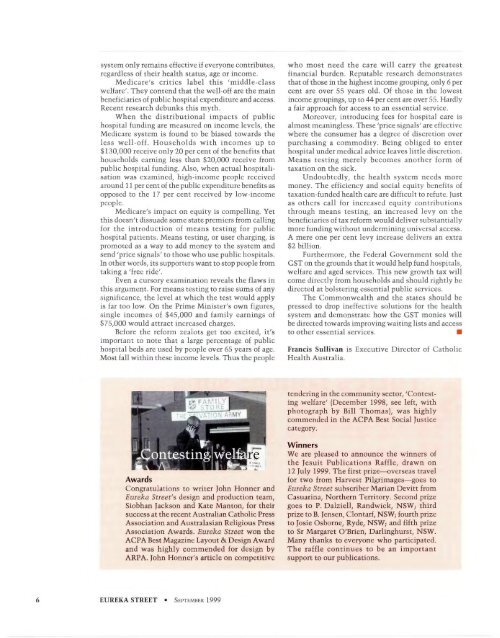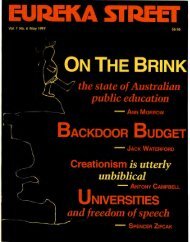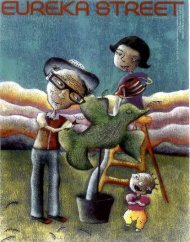1 - Eureka Street
1 - Eureka Street
1 - Eureka Street
- No tags were found...
Create successful ePaper yourself
Turn your PDF publications into a flip-book with our unique Google optimized e-Paper software.
system only remains effective if everyone contributes,regardless of their health status, age or income.Medicare's critics label this 'middle- classwelfare'. They contend that the well-off are the mainbeneficiaries of public hospital expenditure and access.Recent research debunks this myth.When the distributional impacts of publichospital funding are measured on income levels, theMedicare system is found to be biased towards theless w ell-off. H o useholds with incomes up to$130,000 receive only 20 per cent of the benefits thathouseholds earning less than $20,000 receive frompublic hospital funding. Also, when actual hospitalisationwas examined, high-income people receivedaround 11 per cent of the public expenditure benefits asopposed to the 17 per cent received by low-incomepeople.Medicare's impact on equity is compelling. Yetthis doesn't dissuade some state premiers from callingfor the introduction of means testing for publichospital patients. Means testing, or user charging, ispromoted as a way to add money to the system andsend 'price signals' to those who use public h ospitals.In other words, its supporters want to stop people fromtaking a 'free ride'.Even a cursory examination reveals the flaws inthis argument. For m eans testing to raise sums of anysignificance, the level at which the test would applyis far too low. On the Prime Minister's own figures,single incom es of $45,000 and family earnings of$75,000 would attract increased charges.Before the reform zealots get too excited, it'simportant to note that a large percentage of publichospital beds are used by people over 65 years of age.Most fall within these income levels. Thus the peoplewho most need the care will carry the greatestfinancial burden. Reputable research demonstratesthat of those in the highest income grouping, only 6 percent are over 55 years old. Of those in the lowes tincome groupings, up to 44 per cent are over 55. Hardlya fair approach for access to an essential service.Moreover, introducing fees for hospital care isalmost m eaningless. These 'price signals' are effectivewhere the consumer has a degree of discretion overpurchasing a commodity. Being obliged to enterhospital under medical advice leaves little discretion.M eans testing merely becomes another form oftaxation on the sick.Undoubtedly, the health system needs moremoney. The efficiency and social equity benefits oftaxation-funded health care are difficult to refute. Justas others call for increased equity contributionsthrough means testing, an increased levy on thebeneficiaries of tax reform would deliver substantiallymore funding without undermining universal access.A m ere one per cent levy increase delivers an extra$2 billion.Furthermore, the Federal Government sold theGST on the grounds that it would help fund hospitals,welfare and aged services. This new growth tax willcome directly from households and should rightly bedirected at bolstering essential public services.The Commonwealth and the states should bepressed to drop ineffective solutions for the healthsystem and demonstrate how the GST monies willbe directed towards improving waiting lists and accessto other essential services.•Francis Sullivan is Executive Director of CatholicHealth Australia.tendering in the community sector, 'Contestingwelfare' (December 1998, see left, withphotograph by Bill Thomas), was highlycommended in the ACP A Best Social Justicecategory.AwardsCongratulations to writer John Honner and<strong>Eureka</strong> <strong>Street</strong>'s design and production team,Siobhan Jackson and Kate Manton, for theirsuccess at the recent Australian Catholic PressAssociation and Australasian Religious PressAssociation Awards. <strong>Eureka</strong> <strong>Street</strong> won theACP A Best Magazine Layout & Design Awardand was highly commended for design byARPA. John Hanner's article on competitiveWinnersWe are pleased to announce the winners ofthe Jesuit Publications Raffle, drawn on12 July 1999. The first prize-overseas travelfor two from Harvest Pilgrimages-goes to<strong>Eureka</strong> <strong>Street</strong> subscriber Marian Devitt fromCasuarina, Northern Territory. Second prizegoes to P. Dalziel!, Randwick, NSW; thirdprize to B. Jensen, Clontarf, NSW; fourth prizeto Josie Osborne, Ryde, N SW; and fifth prizeto Sr Margaret O'Brien, Darlinghurst, NSW.Many thanks to everyone who participated.The raffle continues to be an importantsupport to our publications.6EUREKA STREET • S EPTEMBER 1999
















